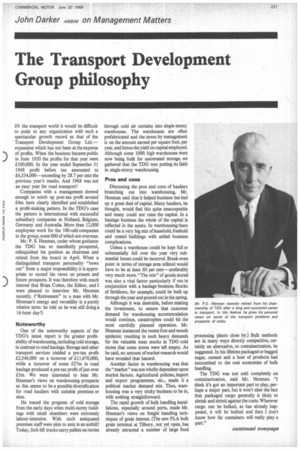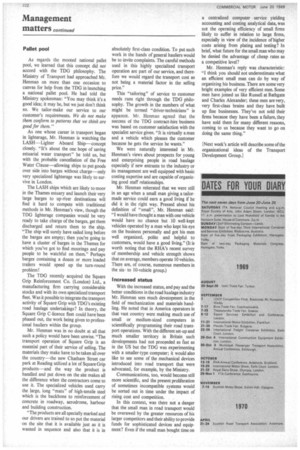The Transport Development Group philosophy
Page 223

Page 224

If you've noticed an error in this article please click here to report it so we can fix it.
IN the transport world it would be difficult to point to any organization with such a spectacular growth record as that of the Transport Development Group Ltd.— expansion which has not been at the expense of profits. When the business became public in June 1950 the profits for that year were £100,000. In the year ended September 31 1968 profit before tax amounted to £6,334,000—exceeding by 28.7 per cent the previous year's results. And 1968 was not an easy year for road transport! • Companies with a management shrewd enough to notch up post-tax profit around £4m have clearly identified and established a profit-making pattern. In the• TDG's case the pattern is international with successful subsidiary companies in Holland, Belgium, Germany and Australia. More than 12,000 employees work for the 100-odd companies in the group, some 800 of which are overseas.
M. P. S. Heiman, under whose guidance the TDG has so manifestly prospered, relinquished his position as chairman and retired from the board in April. When a distinguished transport personality "bows Out" from a major responsibility it is appropriate to record his views on present and future prospects. It was therefore with much interest that Brian C ottee, the Editor, and I were pleased to interview Mr. Henman recently. ("Retirement" to a man with Mr. Herman's energy and versatility is a purely relative term: he told us he was still doing a 16-hour day!)
Noteworthy
One of the noteworthy aspects of the IDG's latest report is the greater profitability of warehousing, including cold storage, in contrast to road haulage. Storage and other transport services yielded a pre-tax profit £2,546,000 on a turnover of £11,676,000, while a turnover of some £27m in road haulage produced a pre-tax profit ofjust over £3m. We were interested to hear Mr. Henrnan's views on warehousing prospects as this .seems to be a possible diversification for road hauliers with suitable premises or sites.
He traced the progress of cold storage from the early days when multi-storey buildings with small chambers were extremely labour-intensive. With such antiquated premises staff were akin to ants in an anthill! Today, fork-lift trucks carry pallets on lorries through cold air curtains into single-storey warehouses. The warehouses are often prefabricated and the stress by management is on the amount earned per square foot, per year, and hence the yield on capital employed. Although some 100ft high warehouses were now being built for automated storage, we gathered that the TDG was putting its faith in single-storey warehousing.
Pros and cons
Discussing the pros and cons of hauliers branching out into warehousing, Mr. Henman said that it helped business but tied up a great deal of capital. Many hauliers, he thought, would find this quite unacceptable and many could not raise the capital. In a haulage business the whole of the capital is reflected in the assets. In warehousing there could be a very big mix of leasehold, freehold and rented buildings with added business complications.
Unless a warehouse could be kept full or substantially full over the year very substantial losses could be incurred. Break-even point in terms of storage area utilized would have to be at least 60 per cent—preferably very much more. "The mix" of goods stored was also a vital factor particularly if run in conjunction with a haulage business. Stocks of fertilizers, for example, could be built up through the year and poured out in the spring.
Although it was desirable, before making the investment, to ensure that customer demand for warehousing accommodation would continue, catastrophes could hit the most carefully planned operation. Mr. Henman instanced the recent foot and mouth epidemic resulting in such heavy demands for the valuable meat stocks in TDG cold stores that some stores were left empty. As he said, no amount of market research would have revealed that hazard.
Another factor in warehousing was that the "market" was not wholly dependent upon market factors. Agricultural policies, import and export programmes, etc., made it a political market demand mix. Thus, warehousing was a very tricky business to be in, with nothing straightforward.
The rapid growth of bulk handling installations, especially around ports, made Mr. Henman's views on freight handling techniques of great interest. (The new PLA bulk grain terminal at Tilbury, not yet open, has already attracted a number of large food processing Wants close by.) Bulk methods are in many ways directly competitive, certainly an alternative, to containerization, he suggested. In his lifetime packaged or bagged sugar, cement and a host of products had succumbed to the cost economies of bulk handling.
The TDG was not sold completely on containerization, said Mr. Henman. "I think it's got an important part to play, perhaps a major part, but it won't alter the fact that packaged cargo generally is likely to shrink and shrink against the costs. Wherever cargo can be bulked, as has already happened, it will be bulked and then I don't know how far containers will really play a part." Pallet pool As regards the mooted national pallet pool, we learned that this concept did not accord with the TDG philosophy. The Ministry of Transport had approached Mr. Henman on more than one occasion to canvas for help from the TDG in launching a national pallet pool. He had told the Ministry spokesman: "You may think it's a good idea; it may be, but we just don't think so. We tailor-make our service to our customer's requirements. We do not make them conform to patterns that we think are good for them."
As one whose career in transport began in lighterage, Mr. Henman is watching the LASH—Lighter Aboard Ship—concept closely. "It's about the one hope of saving estuarial water transport" he told us, but with the probable cancellation of the Free Water Clause—allowing ships to put goods over side into barges without charge—only very specialized lighterage was likely to survive in London.
The LASH ships which are likely to moor in the Thames estuary and launch their very large barges to up-river destinations will find it hard to compete with traditional methods in Mr. Henman's view, though the TDG lighterage companies would be very ready to take charge of the barges, get them discharged and return them to the ship. "The ship will surely have sailed long before the barges are empty; then you're going to have a cluster of barges in the Thames for which you've got to find moorings and pay people to be watchful on them." Perhaps barges containing a dozen or more loaded trailers would speed up the turn-round problem!
The TDG recently acquired the Square Grip Reinforcement Co. (London) Ltd., a manufacturing firm carrying considerable stocks and with its own specialized transport fleet. Was it possible to integrate the transport activity of Square Grip with TDG's existing road haulage undertakings? In theory, the Square Grip C-licence fleet could have been phased out, the work being given to professional hauliers within the group.
Mr. Henman was in no doubt at all that such a policy would have been unwise. "The transport operation of Square Grip is an essential part of their service of selling. The materials they make have to be taken all over the country—the new Chatham Street car park at Reading utilized a lot of Square Grip products—and the way the product is handled and put down on the site makes all the difference when the contractors come to use it. The specialized vehicles used carry the large, long "mats" of high-tensile steel which is the backbone to reinforcement of concrete in roadway, aerodrome, harbour and building construction.
"The products are all specially marked and our drivers are trained to so put the material on the site that it is available just as it is wanted in sequence and also that it is in absolutely first-class condition. To put such work in the hands of general hauliers would be to invite complaints. The careful methods used in this highly specialized transport operation are part of our service, and therefore we would regard the transport cost as not being a material factor in the selling price."
This "tailoring" of service to customer needs runs right through the TDG philo sophy. The growth in the numbers of what might be termed "driver-technicians" is apparent. Mr. Henman agreed that the success of the TDG contract-hire business was based on customer satisfaction with the specialist service given. "It is.virtually a man and a vehicle which pleases the customer because he gets the service he wants."
We were naturally interested in Mr. Henman's views about prospects for young and enterprising people in road haulage especially if new entrants to the industry or its management are well equipped with basic costing expertise and are capable of organizing good staff relationships.
Mr. Henman reiterated that we were still in an age when a small man giving a tailor made service could earn a good living if he did it in the right way. Pressed about his definition of "small", Mr. Heilman said:
"I would have thought a man with one vehicle
would have no chance but 10 well-kept vehicles operated by a man who kept his eye on the business personally and got his men
well organized, polite and helpful to customers, would have a good living." (It is
worth noting that the RHA's recent survey of membership and vehicle strength shows that on average, members operate 10 vehicles. There are, of course, numerous members in the sixto 10-vehicle group.) Increased status With the increased status, and pay and the better conditions in the road haulage industry Mr. Henman sees much development in the field of mechanization and materials handling. He noted that in America operators in that vast country were making much use of small or medium-sized computers in scientifically programming their road transport operations. With the different set-up and much smaller territory in Britain such developments had not proceeded as fast as in the US but the TDG was experimenting with a smaller-type computer; it would also like to see some of the mechanical devices introduced into road transport that were advocated, for example, by the Ministry.
Communications, too, would become still more scientific, and the present proliferation of sometimes incompatible systems would be sorted out in time under the impact of rising cost and competition.
In this context, was there not a danger that the small man in road transport would be overawed by the greater resources of his larger competitors and their ability to provide funds for sophisticated devices and equipment? Even if the small man bought time on a centralized computer service yielding accounting and costing analytical data, was not the operating efficiency of small firms likely to suffer in relation to large firms, especially in view of the incidence of higher costs arising from plating and testing? In brief, what future for the small man who may be denied the advantage of cheap rates as a competitive level?
Mr. Henman's reply was characteristic: "I think you should not underestimate what an efficient small man can do by way of organizing his business. There are some very bright examples of very efficient men. Some men have joined us like Russell at Bathgate and Charles Alexander; these men are very, very first-class brains and they have built up fine businesses. They've not sold their firms because they have been a failure, they have sold them for many different reasons, coming to us because they want to go on doing the same thing."
[Next week's article will describe some of the organizational ideas of the Transport Development Group.]










































































































































































































































































